Learning the bass guitar can be a tricky and frustrating thing. New and old students alike often see their progress plateau or experience difficulty playing what they want on a performance. To make sure this doesn’t happen to you, here’s a list of 10 tips for learning the bass guitar.
Find A Good Bass Guitar Teacher
A good teacher is the most valuable thing in the world. They can spot your weaknesses but most importantly, show you how to improve them. By having guitar lessons, they will help you become the best bass player possible.
Your teacher will also have experience of many of the situations you’ll be going through as a student too.
- Feeling nervous about your next gig? They’ve been there and can help you.
- Not sure what to play at your next audition? They can suggest some great pieces which display your talents as a bass player.
- Want to find an interesting new challenge? They’ll show you what to look at.
The list really could go on for days. But how do you know when you’ve got a good bass guitar teacher? Look for the simple things.
- Do you like the way they explain things to you?
- Do you have a good personal connection with them?
- Do they make you inspired to learn?
- Do you always look forward to your next lesson with them?
- Are you in awe of them as a bass player?
If you answered yes to most or all of these questions, then you’ve found a good teacher. A good teacher doesn’t just teach you how to play a bass line. They will inspire you to become a brilliant bass player; one who loves their guitar lessons, one who loved playing bass lines and improvising around the root note and one who will help you with your bass playing for years to come.
P.S. There are a load of teachers in our Ted’s List VIP Facebook Group. So feel free to apply for membership (no cost…)
Finger Exercises
Though they may seem mundane at times, doing finger exercises – even for a few minutes each day – will make you a much better bass guitar player.
All good bass guitarists need to be able to get the most out of their hands and this means having a few weaknesses and technical blind spots as possible.
Think of finger exercises as being similar to general conditioning that athletes do.
Yes, you’re unlikely to ever play a piece of music that is a finger exercises from start to finish but that would be to miss the point of the exercises entirely. They are there to give you a general level of ability that you can then apply to the music you play.
Just as taking a 30-minute jog each day will give you a decent level of general fitness, adding 10 minutes of finger exercises to your practice routine each day will make your playing smooth and consistent.
Something all bass guitar players should strive for.
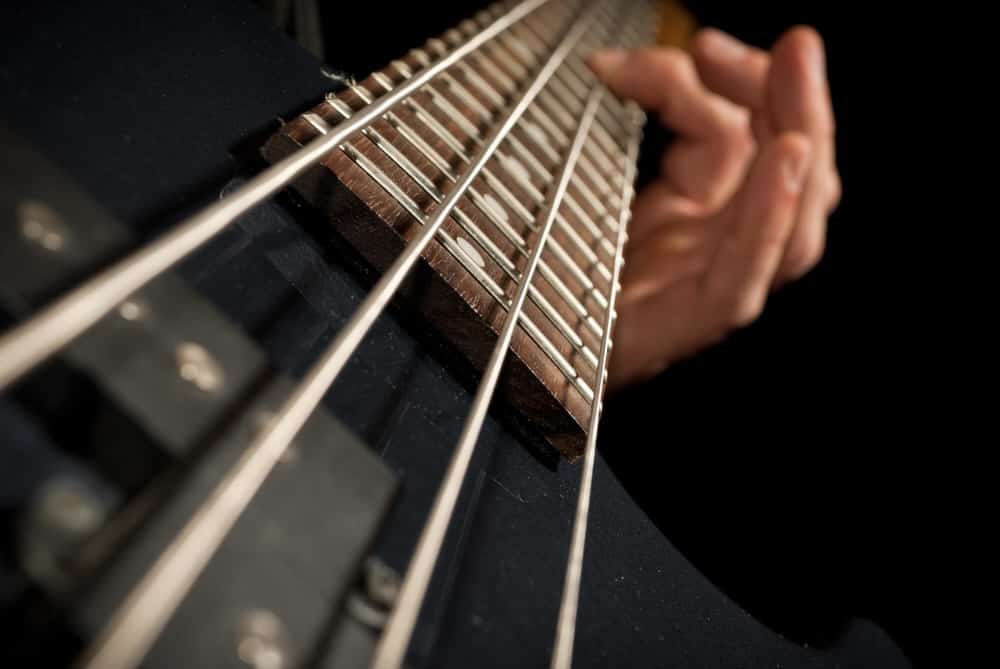
Get A Music Stand
Whilst you may think that it’s okay to balance your sheet music over your crossed leg as you sit down to practice your beloved bass guitar, you’ll start to think differently once playing aches and pains set in.
And what could’ve avoided those aches?
Getting a decent music stand.
A decent music stand means no more awful posture when playing and trying to balance sheet music on your knee.
But it also means you can have your music where you can best see, you can spread out multiple sheets so you don’t have awkward page turns and a good music stand is something you can easily take to a lesson, band practice or performance.
Personally, I always think it’s worth getting something that’s well built and that will last a long time. We recommend the Eastar Folding Sheet Music Stand EMS-1 as it also comes with a carry bag, a clip (for playing outdoors) and a light!
Yes, it may cost a little more initially but it will be such a worthwhile investment and many good music stands can last as long as ten years.
For comparison, a poorly made one can break in a few weeks.
Always Learn Something New
Learning an instrument like the bass guitar is a lot like going exploring. It only truly feels like it’s been worth it when you find something new.
However, to find new things you have to look in new places, listen to new things and speak to new people.
A great way to do this is by engaging with the electric guitar community via a regular magazine, online forum or YouTube channel.
A magazine, for example, will have new columns for you to read each month and many of the writers give out small weekly lessons complete with new exercises to try and music to listen to.
Online forums will have debates between different guitar players on a wide range of topics. Watch out though. These can get pretty heated sometimes!
And a good YouTube channel will post new videos each week for you to work through. We have a dedicated Ted’s List YouTube Bass Guitar playlist that you might find interesting.
Learning new things will broaden your horizons and keep you motivated to improve.
Learn Music That You Love
Simply put, learning the bass guitar will be ten times more enjoyable if you’re learning the music that inspired you to pick up the bass to begin with.
This isn’t something that’s just aimed at beginners either.
Many professionals – jazz musicians in particular – will dedicate a large part of their practice time to learning music that inspires them.
Not only does this increase each musician’s repertoire but it also keeps them inspired and makes such that the joy of playing music is never lost.
If all you do is play endless scales and arpeggios then it can feel a little soulless and you’ll likely feel that you’re not getting anywhere (although they are important – so if you need help on them, check out our Bass Guitar Technique article…).
However, if you can pick up the bass after a hard day at school or work and relax for the evening by playing through your favorite songs then you’ll associate playing the bass guitar with fun and enjoyment.
And this feeling will always keep you coming back to the bass guitar for more.
“Study rhythm and groove. Learn to use subdivisions as that helps you feel the rhythm between each beat.”
– Daniel Morrisi, Berklee
Get An Amplifier
For electric bass players an amplifier – even if it’s just a small one – is an absolute must.
The electric bass guitar isn’t an acoustic instrument and won’t make much noise on its own. An amplifier will amplify the sound of your bass so that you can clearly hear yourself when you play.
Now a good amplifier doesn’t have to cost the earth. In fact, defining “good” varies very much from player to player.
Try to find an amp that suits your own unique musical needs.
If you just play at home for your own amusement, then look at getting a small practice amp. It won’t make much noise or take up much room in your home but it will provide you with all the volume you need to hear yourself. This 35W Electric Bass Amp by Gear4music is an excellent example of an amp that has more power than the ‘big brands’ for the same price.
If you play regularly in a band and are to buy something that will give you enough volume at your next rehearsal or gig, but that you can also use at home as your practice amp; then try out the Ampeg BA-115 V2 – it has the perfect weight to power combination, making it portable, but just loud enough for your gigs!
Lastly, if you’re looking for THE amp that you’ll only use in live performance, and you want to look cool, there is no better than the world famous Fender Rumble.
Structure Your Practice Routine
If you want to play well then you’ll need to practice well. And if you want to practice well then you’ll need to know what to practice.
A well-structured practice routine will give you guidance and focus during those valuable practice hours.
It will also make sure you don’t waste your time trying to figure out what to practice, checking Facebook or just generally wasting time.
It’s often a good idea to allocate a certain amount of time to each thing you need to practice within your routine.
The more you need to work on something – scales for example – then the more time you should allocate it.
If you’re unsure about how to structure your time well or how to come up with a good practice routine then speak to your teacher, or read our dedicated article on ‘How To Practice The Bass Guitar‘.
Learn Fingerstyle & Plectrum Technique
This is quite a contentious point for many bass players. There’s a large movement in the bass community that says “real bass guitar players don’t use a pick” and it’s important that we take time to acknowledge this point of view for what it really is.
Total nonsense.
Whilst playing with a pick isn’t as common for bass players as using the fingers, pick technique is still a vital sound that great bass players can draw on and that they really need to know.
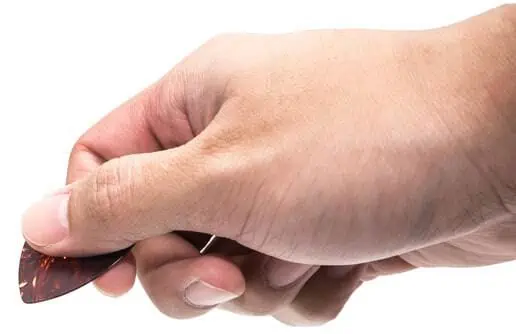
If you disagree then chat to legendary session bassist Carol Kaye. She played on over 10,000 records using a pick. And if you think that number is bolstered by loads of unknown records or radio jingles then you’re wrong.
If a pick worked for her when she recorded “Good Vibrations” for The Beach Boys then it will certainly work for you too!
It’s worth always stocking up on extra plectrums because no matter how carefully you keep track of them, sooner or later your plectrums will go missing. But the good news is they are cheap. I love this particular plectrum, it comes in a pack of 48 and it’s cheap!
Neither of these techniques is better than the other. They are just different but both equally important.
Trying to say you should do one or the other is like saying “should I buy a new car that has an engine or wheels?”.
The reality is they are both important and you need both for the car to work!
Why should your bass guitar playing be any different?
Learn Music!
This might sound like a contrary point. Especially after I’ve spent large portions of this article stressing the importance of scales, chords, arpeggios and the like. But don’t get me wrong. I’m not trying to say those things are bad.
What I’m saying is they’re stepping stones to something bigger.
To be able to play actual pieces of music.
Learning to play songs in a group is ultimately the destination where many, if not all, aspiring musicians want to end up.
Playing actual songs with others gives you a new and challenging context to put yourself in. It’s a much harder test of your mettle but it’s also one that is far more rewarding in the long run.
You’ll learn the most by having this performance-based context to apply your hard-earned knowledge gained from hours of practice and you’ll have a great time entertaining your friends with the great songs you can play.
Play With Other Musicians
When you play an instrument like the bass it’s almost inevitable that, sooner or later, you’ll be asked to join a band. And if that happens, you really should say yes.
Why is it so inevitable? Simply put, there aren’t many bass players. Far more people chose popular instruments like drums, guitar or vocals.
But this is where it actually pays to be a bass guitar player.
Sure your instrument isn’t seen to be as “cool”, as popular or difficult as the guitar (by the way no professional musician of any instrument thinks any of that is true about the bass) but if you practice hard and put the time in you’ll soon have twice or three times as many gig offers as any guitarist out there because you’ll be a valuable commodity that’s in short supply.
This means you’ll get far more live performance experience in half the time. This will boost your confidence and your skills in a way that simply practicing at home never could.
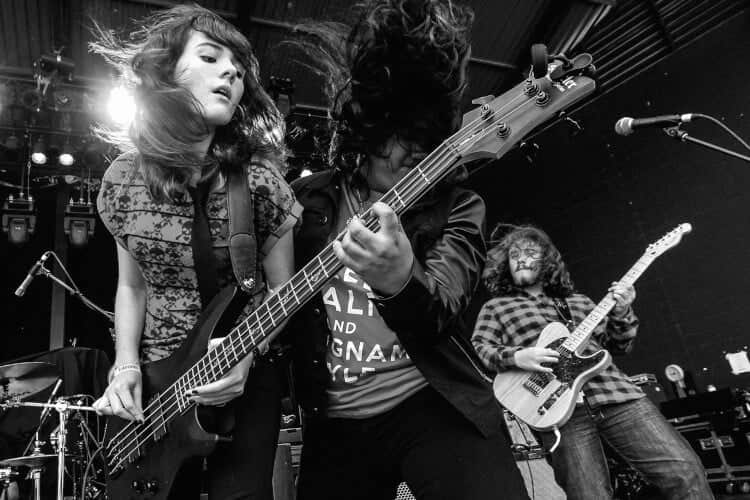
Learning the bass guitar - top 10 tips
Summary
Do you have to follow all ten tips to play the bass guitar well? In short, no. Follow those that appeal to you and make you inspired to play and you won’t go far wrong.
However, if there was one rule that is a must, then it’s number one. A good teacher, regardless of your personal goals, is always worth their weight in gold!
Now go and enjoy those low notes!
Do you want to share this infographic on your site? Use this code...
FAQ's
The honest answer is by practicing hard. When you start playing, it feels like a very long road to the pot of gold where you can play whatever you want, however you want. In truth though, the more you learn, the more you realize that bass playing is all about the journey – not the destination. Enjoy your bass guitar. Learn everything that’ll give you a greater understanding of the instrument – including music theory. Focus on technique exercises. And above all, enjoy the musical journey.
If you want to learn bass guitar by yourself, then watch some really great YouTube tutorials, and read all the advice on the Ted’s List website. We have lots of tips and tricks, from understanding how a bass line works, through to playing a major scale, and everything in between! A bass player is someone who takes care of the details – so don’t rush, or learn bad habits. Enjoy the journey!
The best tip I can give on what to learn first on a bass guitar is to do your research on tuition methods. If you’re going down the self-taught route – then review YouTube lessons, read tutorials on the Ted’s List website, and make sure the advice you are getting is from a professional. Ideally, you would get proper bass guitar lessons. Your teacher will help you learn different styles of music, teach you about chords, strings, how to play bass lines, help you understand what a root note is, and much much more.
Is it easier to learn the play the bass guitar or an electric or acoustic guitar, is a question that is often asked. In truth, they are so different it’s impossible to answer. If you are wondering which instrument to play, definitely don’t learn the one you think is ‘the easiest’. You won’t enjoy it or stick to it. The trick is to play the instrument that you are burning to play. The one your gut is telling you is magical. if you really want to become a bass player, you’ll know it in your heart. Forget about easy – think about enjoyment regardless of how difficult things are.



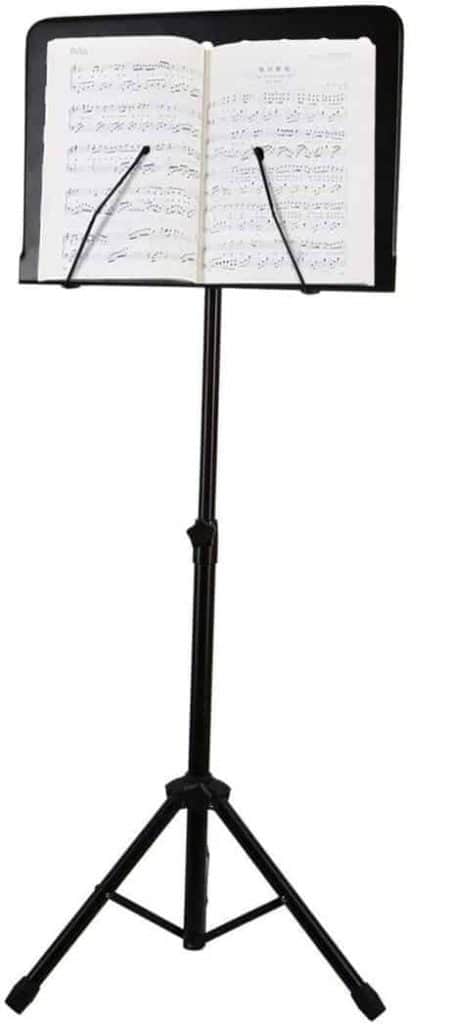
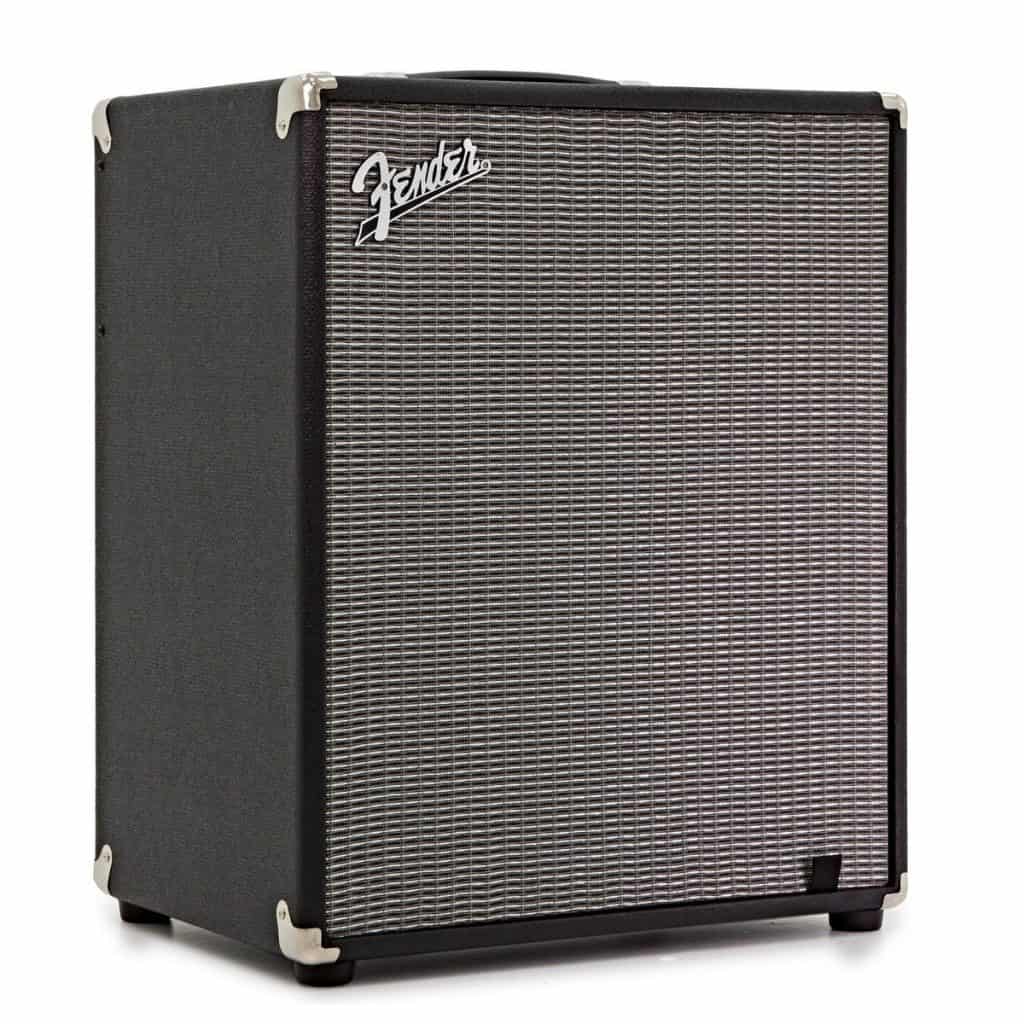
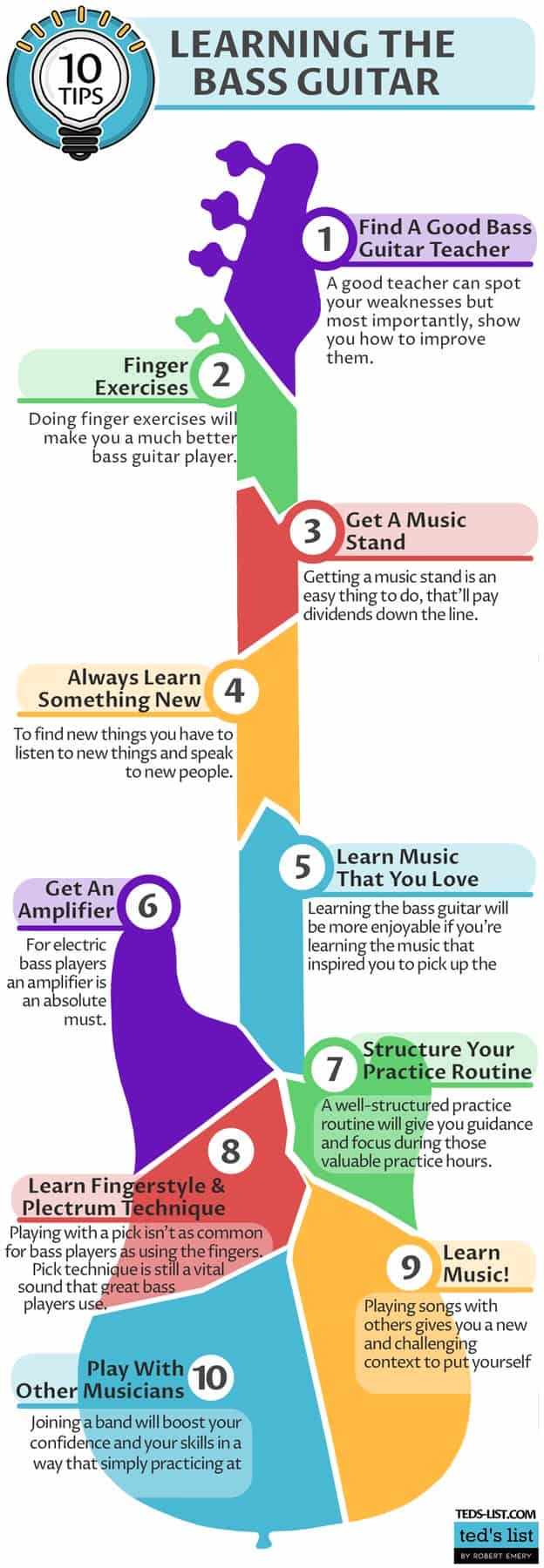







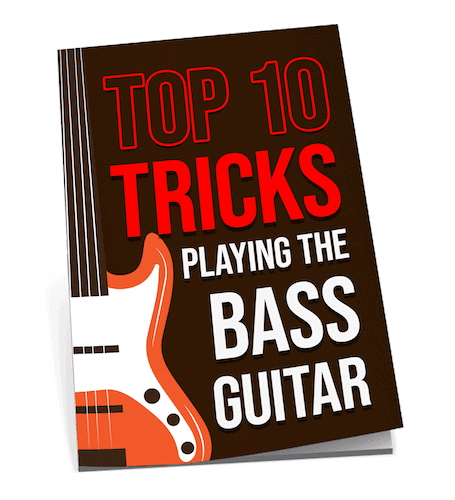
While the article lays out a decent foundation for beginners, I must raise a point about the lack of emphasis on music theory in your ‘Learn Music’ section. Understanding the fundamentals of music theory is crucial for a bass player, not just for soloing but for creating cohesive bass lines that fit within the structure of a song. Any recommendations for resources focused on this?
FretlessFredd makes a valid point. Incorporating music theory early on can dramatically enhance a bass player’s understanding and execution. For starters, ‘Music Theory for Bassists’ by Sean Malone offers a comprehensive guide from a bass perspective.
I’m curious about the part where you mentioned learning both fingerstyle and plectrum technique. I’ve always thought that sticking to one would be enough to master the bass. Is it common for bassists to switch between these techniques, or is it more about personal preference?
Really enjoyed the section on finger exercises and the emphasis on learning music you love. It makes the whole process of picking up bass that much more enjoyable. The advice on getting an amplifier early on is spot on, changes the whole vibe when you can actually hear your bass thumping. Cheers for the tips!
What amp would you guys recommend for a total newbie? Don’t want to break the bank.
Glad you found it useful! Wait until you dive deeper into different genres, the bass lines can get really funky. Keep on thumping!
Thank you, I’ll continue reading an putting it all to use, very helpful, cheers
Thanks Matt for your comments. If we can help in any other way please do let us know.
Bass Guitar Supremacy! Learning the superior guitar and as a pro, I agree with these tips! I think a collaboration is needed, what do you say, Ted’s List?
Hi Jamie. Please contact me directly…